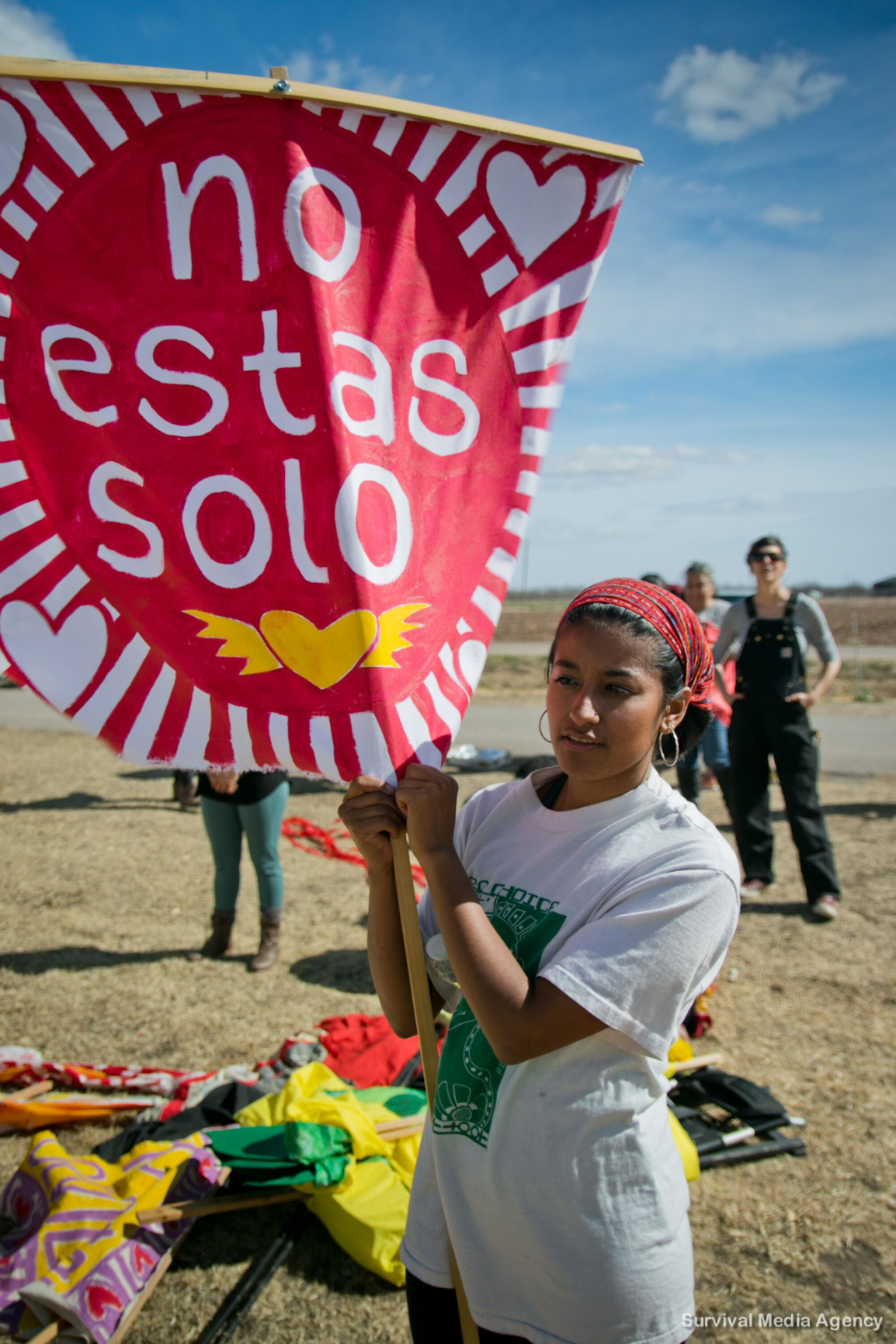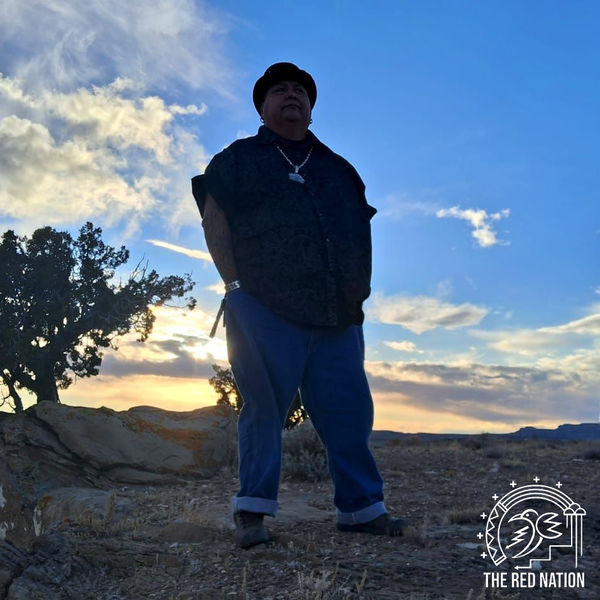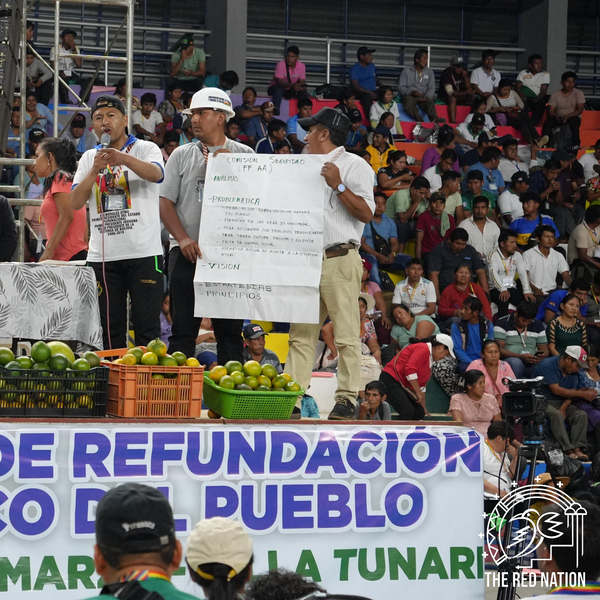The Red Nation & Tornillo: The Occupation Coalition, A Weekend of Revolutionary Love - Part 1

by Hope Alvarado
This is the first part of a two-part series. Read part two here.
From February 14-17, the Red Nation sent a second delegation to Tornillo, Texas to participate in a series of demonstrations called A Weekend of Resistance for Migrant Justice organized by the Tornillo: The Occupation Coalition. This was part of a national call to action for a “weekend of revolutionary love” coupled with opportunities for people everywhere to mobilize and disrupt migrant detention and deportation centers. Our coalition was made up of local organizers from the El Paso-Tornillo areas, as well as out-of-state organizers based in Tiwa Territory (Albuquerque, NM), Tewa and Cochiti Territory (Santa Fe, NM), O’odham, Tohono O’odham , and Hohokam Territories (Tucson, AZ), Ohlone and Chochenyo (Oakland, CA), and Osage and Miami Territories (St. Louis, MO). Our first stop was to the Tornillo Toll Plaza and Port of Entry, in Raramuri Territory (Tornillo, TX) where organizers from different communities came together to create art with messages for the upcoming weekend demonstrations.
Day 1: Revolutionary Love
We arrived at the Toll Plaza and immediately jumped into helping with the art demonstrations, such as tying together Valentine’s Day postcards created by young students, many of whom were Native, from St. Louis and Lenape (New York City, NY), to the hanging of paper flowers on the trees at the Port of Entry. These were used to provide a visual for the children in detention facilities, to show that there are people on the outside fighting for them. We helped with adding strings to Revolutionary Love Kites—which were painted with barbed wire hearts, water jugs, and a revolutionary fist—that would be flown over the border wall to give people on the other side a visual. We also created large banners that we planned to carry at the demonstrations.
Only half an hour after we arrived, a combination of county sheriff’s deputies, private security, and Department of Homeland Security officers approached us about the flowers that we were hanging up on the trees near the Port of Entry. The trees were on federal property, so the officers told us to take them down. They stated that since it was federal property. A deputy named “Turk” cited a code that we could not leave trash or rubbish behind on federal property and issued paperwork outlining those codes. It wasn’t trash, it was art. We continued to put them up, even after some of the officers followed behind us and took them down. While they continued to surveil and intimidate us, we finished our work while dancing to cumbia music. Thereafter, an art resistance group named Mijente from Kiwa Territory set up a giant inflatable Trump dressed in a Ku Klux Klan hood and gown at the Port Of Entry. We began live-streaming and sharing the art on various social media platforms, as well as giving personal testimonies about why we were there and why we believed other people should join us. To close this preparation day, The Red Nation organizers and some of the Ferguson freedom fighters facilitated a conversation about direct action safety, protocols, and the agenda for the upcoming events during the next few days.

Day 2: Southwest Key and Processing Center
The morning started out with the Tornillo caravan meeting up again at the Toll Plaza. The caravan consisted of several cars with various slogans written on the windows that center and embody the intersectional nature of our struggles. There were car windows connecting the struggles of Indigenous migrants from Turtle Island (North America) to Palestine, to the contamination of Indigenous lands and sacred sites such as Chaco Canyon, the greater Chaco region, and Bears Ears. We wanted to bridge the struggle of defending and protecting sacred sites due to the recent confiscation Guadalupe Peak and Hueco Tanks by National Park Rangers in El Paso (in which where park rangers chased out Native peoples from accessing their own homelands) to the history of Lifta, a Palestinian village that was turned into a National Park by the Israeli government, which evicted all the Palestinians from their homelands. Red Nation organizer Demetrius drew comparisons from his time at the wall in the West Bank of Palestine to the wall that was being constructed in Rarámuri Territory. The international struggles of Indigenous peoples against colonization and capitalism was clear. The slogan “No One Is Illegal On Stolen Land” was on every car in the caravan because we felt it was important to acknowledge that we were on stolen Raramuri territory and forefront that every bordertown nearby benefits from the land and resource theft of Raramuri peoples at the Port Of Entry.
We then drove to the U.S.-Mexico Border underneath the bridge at the Tornillo Port of Entry and flew the revolutionary love kites over the border, where supporters on the other side began honking car horns. After flying kites, we made our way to the Tornillo Southwest Key facility.


The Southwest Key facility is based out of Texas, which is, according to them, one of the largest non-profit shelter providers for “unaccompanied immigrant minors and immigrant youth separated from their parents.” Southwest Key is recognized by the UN Human Rights Council for “excellence” in Shelter Services for unaccompanied migrant youth. The corporation actively detains about one-third of the migrant minors crossing the border. Southwest Key shelters have, however, drawn scrutiny after several incidents of sexual assault and abuse in its Arizona facilities. The company also has 24 permanent concentration camps throughout Texas, Arizona, and California.
Two Southwest Key facilities in Arizona were closed down due to video footage showing violence and sexual assaults on youth by Levian Pacheco, a youth care provider in Mesa, guilty and convicted of sexually assaulting nine boys over an 11 month time frame, while also testing positive for HIV/AIDs and Hepatitis C. During his employment, Pacheco hadn’t been required to do a background check in more than four months. These facilities were closed for failing to provide documentation that their staff members had completed the required background checks. Clearly, these facilities are desperate to hire anyone and have used loopholes to hire pedophiles and rapists. The remaining shelters in Arizona had their licenses revoked but continue to “care” for migrant children in their facilities.
It is no surprise that a system built on the genocide of Indigenous people and enslavement of African peoples across this continent is currently imprisoning migrant families in concentration camps. The U.S. continues to profit from undocumented bodies, whether they are working in the fields under exploitive labor conditions or incarcerated in a detention facility. Undocumented families supply money and labor to the U.S. but don’t receive the benefits or protections. The connection between the carceral system, immigration system, and multi-million dollar corporations is made clear by the notorious example of a Walmart Supercenter in Brownsville, Texas serving as one of the largest Southwest Key facilities, detaining over 1,400 migrant minors.
In 2017, large private prisons profited immensely from detaining migrants, including those who were in the process of being deported, asylum seekers, migrants awaiting a hearing in immigration court and those identified “for removal”. Privatize prisons such as CoreCivic, Inc. and GEO Group, Inc. reaped a combine revenue of $4 billion. There are 100 shelters across the U.S. incarcerating migrant children across 17 states that have been reported for similar incidents of abuse and violence. But who holds these institutions accountable?
This is why the Tornillo: The Occupation Coalition decided to make a stop at the Southwest Keys facility in Tornillo, Texas. We wanted to let the children know that they are not alone and that we are fighting for their freedom while also encouraging detention staff members to become whistleblowers to save lives of those incarcerated.
When we arrived to the Southwest Key facility, the children were outside playing soccer and I began chanting “No Están Solos,” “El Pueblo Unido Jamás Será Vencido,” “Whistleblowers Save Lives”, and “Abolish ICE,” while puppets rose over the fences and Tornillo demonstrators tossed the Valentines Day cards in the wind over the fence. The children ran in our direction, smiling, grabbing postcards, and burying them in the sand to read later. They were soon escorted inside the farthest building from us. The Southwest Key staff were seen calling police, and shortly after seven police vehicles arrived. As we were chanting, some of the demonstrators were on the other side of the facility climbing a huge pole to drop a banner that read: No Están Solos! I asked Juan Ortiz, a Rarámuri organizer, to speak and about the struggles of Indigenous people whose lands are being used to persecute, imprison, and violate the rights of many other Indigenous people, many of whom would be considered family or comrades if the U.S.-Mexico border didn’t sever the relationships between Indigenous peoples and communities across Turtle Island.

After the Southwest Key facility, we made our way to the Texas Processing Center in El Paso where nine migrant hunger strikers, called “The El Paso 9,” were being force fed. When we arrived, the processing center closed the entrance so we took the intersection. As cops showed up they informed us that we needed a permit to not only occupy the streets but to also occupy the sidewalks. Despite the threats, we continued to rally because the migrant hunger strikers who were detained just 50 ft behind us were being force fed. Of the nine asylum seekers, eight are from India and one is from Nicaragua. There are also hunger strikers in ICE Facilities in territories belonging to the Seminole (Miami, FL), O’odham, Yavapai, Akimel O’odham, Hohokam (Phoenix), Kumeyaay (San Diego), and Ramaytush, Ohlone (San Francisco). Human Rights Watch has called upon ICE to immediately stop the “inherently cruel, inhuman and degrading” practice of violently and nonconsensually force-feeding migrant strikers.

At the end of the rally we had speakers from the Migrant Detained Solidarity Committee and representatives of the organization South Asian Americans Leading Together (SAALT) who had travel from Washington, DC to be there. Many of the speakers, including SAALT, have been doing work nationally to bring awareness and legal justice to the strikers who had suffered immense violence through the force feeding, as described in the description written by SAALT organizers:
On some of the individuals, the tubes are too large, causing nasal bleeding and pain. Many of the detained asylum seekers have wounds and lesions on their throats and nasal passages, are suffering from rectal bleeding and bleeding while vomiting, persistent stomach pain, and are having difficulty speaking and breathing.
We were told that the hunger strikers inside were able to hear about our action and appreciated our support but we needed to leave by a certain time so that the they could see their visitors. It was an important request. Many of the visitors were legal representatives, so we ended the rally.
We ended the day by debriefing with the entire coalition about the series of events that happened that day and celebrated the victories of taking over the facility and seeing the migrant youth and taking the streets.




